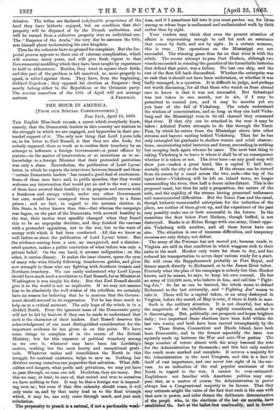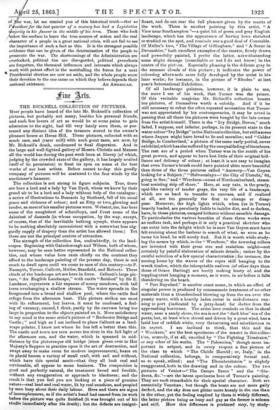THE HOUR IN AMERICA.
[FROM OUR SPECIAL CORRESPONDENT.]
New York, April 10, 1863. THE English Blue-book reveals a secret which everybody knew, namely, that the Democratic leaders in this country are traitors to the struggle in which we are engaged, and hypocrites in their pre- tended support of it. The only new thing that Lord Lyons tells us, in his letter to Earl Russell, is that they are also fools, for nobody supposed them so weak as to confess their treachery by an attempt to influence a foreign Government—a penal offence by statute—in the matter of intervention, or so incautious as to ac- knowledge to a foreign Minister that their pretended patriotism was only a sham. Nevertheless, the publication of Lord Lyons' letter, in which he reports the interviews between himself and these "certain Democratic leaders" has caused a good deal of excitement. Some of these men have said, in public speeches, that they would welcome any intervention that would put an end to the war ; some of them have avowed their hostility to its progres3 and success with a frankness and energy which, under any other Government but ours, would have consigned them incontinently to a State prison ; and no fact, in regard to the autumn election in this State, is better known than this—that whereas the campaign was begun, on the part of the Democrats, with avowed hostility to the war, their tactics were speedily changed when they found this to be an unpopular doctrine, and they finished the canvass with a pretended opposition, not to the war, but to the want of energy with which it had been conducted. All this we knew as well before as since the publication of Lord Lyons' letter. But the evidence coming from a new, an unexpected, and a disinter- ested quarter, makes a public conviction of what before was only a private belief. On the one hand, it arouses indignation ; on the other, it carries dismay. It makes the issue clearer, opens the eyes of many who were blindly following treacherous guides, and gives new strength to those who are fighting with Southern treason and Northern treachery. We can easily understand why Lord Lyons should have made such a revelation to Earl Russell, for as Minister at Washington it was simply his duty. But that Earl Russell should give it to the world is not so explicable. If we may not assume him to be absolutely the well-wisher of the rebellion, we certainly have no reason for believing that he is anxious that the Govern- ment should succeed in its suppression. Yet he has done much to help us at a critical moment. The only hope of the rebels is in a divided North. Even the ignorant mass of the Democratic party will not be led by traitors if they can be made to understand that such is the character of their leaders. Earl Russell deserves the acknowledgment of our most distinguished consideration for the important evidence he has given us on this point. We have some things to complain of in the course of the British Ministry, but for this exposure of political treachery among us we owe it, whatever may have been his Lordship's motive, nothing but the most hearty and unequivocal grati- tude. Whatever unites and consolidates the North in this struggle for national existence, helps to save us. Nothing but division among ourselves can jeopardize that salvation. What diffi- culties and dangers, what perils and privations, we may yet have to peas through, no man can tell. Doubtless, they are many. But this we may, at least, be sure of, that united and true to ourselves we have nothing to fear. It may be that a foreign war is impend- ing over us ; but even if that dire calamity should come, it will only unite us, and by that unity lead us to the final triumph which, it may be, can only come through much, and just such tribulation.
The propensity to preach is a natural, if not a pardonable weak- ness, and if I sometimes fall into it you must pardon me, for ose among us whose hope is undimmed and undiminished walk by f ith rather than by sight.
Your readers may think that even the present situation of
affairs is unpromising enough to call for such an assurance that comes by faith, and not by sight. In a certain measure, this is true. The operations on the Mississippi are not successful. The winning game thus far on that river is with the rebels. The recent attempt to pass Port Hudson, although two
vessels succeeded in running the gauntlet of the formidable batteries
that defend that point, was a failure. We lout one ship, and the rest of the fleet fell back discomfited. Whether the enterprise was so rash that it should not have been undertaken, or whether it was badly managed, is a question. It is difficult to judge, and perhaps not worth discussing, for all that those who watch us from abroad care to know is that it was not successful. But Sebastopol was not taken in one month, nor in six, if I may be permitted to remind you, and it may be months yet ere you hear of the fall of Vicksburg. The rebels understand the wisdom of concentration, and so long as they can hold Vicks- burg and the Mississippi runs in its old channel they command that river. If that city can be attacked in the rear it may be taken ; Admiral Porter attempts to do this through the Yazoo Pass, by which he enters from the Mississippi above into other streams and bayous uniting behind Vicksburg. Thus far he has only entangled his gunboats in shallow waters and rebel obstruc- tions, encountering rebel batteries and forces, succeeding in nothing but escaping back again whence he came. The next best thing to taking Vicksburg is to leave it where it shall be of no consequence whether it is taken or not. The river here—as any good map will show you—makes a great bend, like a capital U laid hori- zontally with the city at the bottom. If the stream can be turned from its course by a canal across the two ends—the top of the upset letter—Vicksburg will be left an inland town, no longer commanding the river, then half a dozen miles distant. This is the proposed canal, but thus far only a proposition, the nature of the soils, and the rapidity of the stream having presented unforeseen and unsurmounted difficulties. But the Yazoo Pass and the canal, though hitherto unsuccessful enterprises for the reduction of the place, are neither of them given up, and the experience of the past may possibly make one or both successful in the future. In the _ meantime the fleet below Port Hudson, though baffled, is not destroyed. Banks is at Baton Rouge with one army, Grant oppo- site Vicksburg with another, and all these forces have one aim. The situation is one of immense difficulties, and temporary reverses are only delays, not defeat.
The army of the Potomac has not moved yet, because roads in Virginia are still in that condition in which waggons sink to their axles in the mud. Hooker only waits for these to dry, and has reduced his transportation to seven days' rations ready for a start. He will cross the Rappahannock probably at Port Royal, and thence march directly to Richmond, or to the James River below.
Precisely what the plan of his campaign is nobody but Gen. Hooker knows, and he means, he says, to keep his own counsel. He has an army of 150,000 men, who believe in him, and call him "Fight- ing Joe." So far as can be learned, the rebels mean to defend Richmond to the last extremity, and "Fighting Joe" means to take it. There will be a capital taken, or an army destroyed in
Virginia, before the month of May is over, if there is faith in man. Such is the military situation. It is not cheerful, but when the magnitude of the rebellion is rightly considered, neither is
it discouraging. But, politically, our prospects and hopes brighten daily ; two important State elections have been held within the last two weeks, and both have been carried triumphantly by the war. These States, Connecticut and Rhode Island, have both been Democratic, and in the former especially the issue . was squarely made up between the War and anti-War parties. The large number of voters absent with the army lessened the vote for the Administration by thousands ; and this fact only renders the result more marked and complete. It secures a majority for the Administration in the next Congress, and this is a fact in itself of vast importance, and one never lost sight of in the can- vass. As an indication of the real popular sentiment of the North in regard to the war, it cannot be over-estimated.
Englishmen not familiar with American politics may sup- pose that, as a matter of course, the Administration in power always has a Congressional majority in its favour. That they may estimate aright the value of the fact that such is the case with that now in power, and infer thence the deliberate determination
of the peopk who, in the elections of the last six months, have established thb.. fact at the ballot-box unalterably, and in favour
of he war, let me remind you of this historical truth—that no P esident for the lust quarter of a century has had a Legislative
ajority in his favour in the middle of his term. Those who look /below the surface to learn the true sources of action and the real character of a people in a great national crisis, will not fail to see the importance of such a fact as this. It is the strongest possible evidence that can be given of the determination of the people to prosecute the war. The shortcomings of the Administration are overlooked, political ties are disregarded, political precedents are forgotten, the thousand influences and interests which always work with potent effect in the marshalling the forces for a next Ilk Presidential election are now set aside, and the whole people avow their devotion to the one cause on which they believe depends their































 Previous page
Previous page